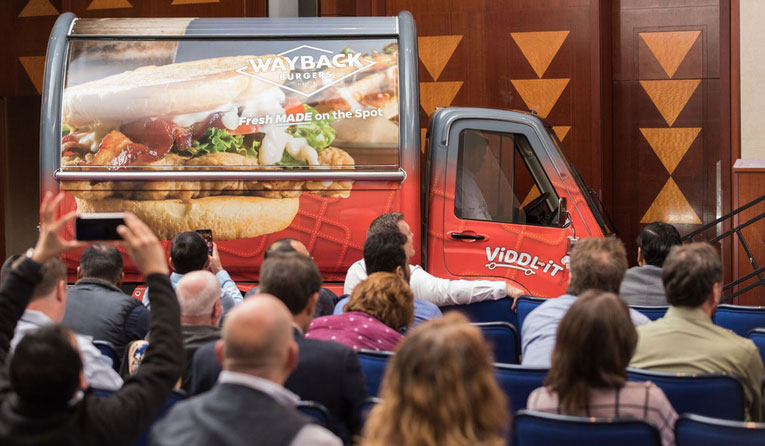On-site Cooking in Electric Vehicles at Wayback Burgers

January 11th, 2019
The characteristics of a well-made hamburger—the juicy patty, melted cheese, premium fixings—are also the very attributes that make travel tough and present a problem for restaurants wanting to capitalize on consumers’ desire for food delivery.
The popular accompaniment of fries, too, can be problematic, and that’s what got John Eucalitto thinking after he saw something in a report from a third-party delivery provider, “that they believed soggy fries were OK.” The president of Wayback Burgers, Eucalitto says he was perplexed by this and decided it was up to him to find a better way for his brand to deliver.

Wayback Burgers unveils Viddl-It at the brand's franchisee convention last fall.
Enter Viddl-It, Wayback’s new electric vehicle initiative that combines the on-site cooking of food trucks with on-demand delivery technology to ultimately bring consumers a better product.
“The bottom line is, delivery food isn’t very good. The packaging can only take it so far,” says Eucalitto. In Wayback’s use of UberEats, Doordash and Grubhub in some areas, the “biggest complaint we heard was on quality, or the driver forgot something.” Viddl-It solves both those problems, Eucalitto continues, and opens up another revenue stream for the Cheshire, Connecticut-based brand.
Wayback has been testing the vehicles, each equipped with a 5-and-a-half-by-8-foot kitchen, for several months in areas around its headquarters, and this week went live with a test of the app. It expects to roll out the Viddl-It package, which will include a full marketing program, to franchisees later this month. ‘Zees got an early look at the system during an unveiling at Wayback’s franchisee convention in October.
“Basically it’s private catering on demand, the food is made fresh on the spot,” explains Eucalitto. “Our goal is to have these trucks roaming everywhere.”
Customers can reserve a Viddl-It vehicle for catering needs and drivers will also accept large or small delivery orders and have a presence in popular nightlife areas. Early sales projections of $1,000 or more for vehicles operating eight hours are “not unrealistic,” Eucalitto says.
Wayback worked with Tropos Technologies out of Morgan Hill, California, to engineer a version of Tropos’ lightweight electric commercial utility vehicles that could be outfitted with a small kitchen. The low-speed vehicles have a delivery radius of one to two miles and will cost about $35,000 for franchisees who elect to integrate Viddl-It into their operations. Work is already underway on a “Gen 2” model that could reach higher speeds and travel further.
Franchisees, notes Eucalitto, are “anxiously awaiting” the official rollout and interest in adding Viddl-It vehicles is high. Once a franchisee commits, there’s a 45- to 60-day turnaround for each vehicle, a relatively short timeframe because Tropos already has an inventory and “we’ll just fabricate the kitchen.”
Those kitchens feature custom-made equipment, including “a piece similar to a pressure cooker for frying,” explains Eucalitto, a modification necessary to enable all-day cooking capabilities. “You can’t be filling up and emptying fryers every time, so we had to solve that equipment piece,” he notes.
Wayback will continue to work with third-party delivery services, though Eucalitto views them more as “marketing tools” to use while the company pursues its own channels.